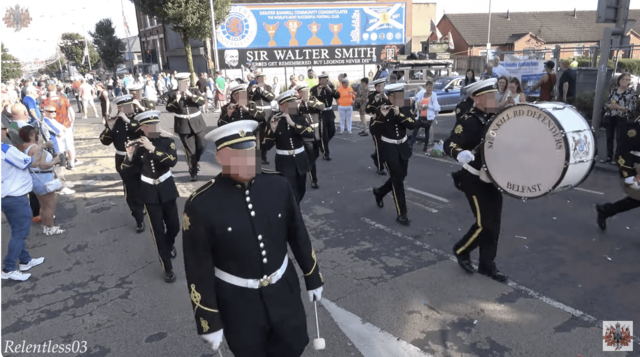The Guinness Book of Records sent a team along to Larne,
To see if there was any truth in an oft-told local yarn.
It was said that in an open space a bonfire huge was hewn,
That stretched from one street to the next and halfway to the moon.
With clipboards, pens and measuring tapes, they went about their task,
And when the sun began to set a man was heard to ask:
‘Is this the biggest you’ve ever seen, is Larne the planet’s best?
Is Craigyhill about to be with trophy and honour blessed?’
The Guinness gaffer clicked his pen and zipped his high-viz coat,
And every loyal watcher felt a tightening in his throat.
‘I’m sorry, chaps,’ the inspector said, with an accent of cut glass,
And a groan of disappoint-ment spread, as if he’d just said Mass.
‘The structure’s tall, the lines are clean and it’s full of smashing stuff,
Pallets bought and stolen, other wood that’s smooth and rough.
Old sofas stuffed with treated foam, for thick smoke that’s your answer,
And there’s only a twenty-five per cent chance you’ll end up getting cancer.
‘Piles of tyres from from fitters’ yards with no disposal duty,
That give off quite the acrid smell, deadly, rich and fruity.
And on the site it’s safety first, the signs are clear and neat,
‘No Buckfast Before Eleven A.M.’; ‘No Kids Over a Hundred feet.’
‘But there’s something key that’s missing, that means it’s not your year,
Something we demand here that’s strict and crystal-clear.
You’re sorely lacking mattresses, a world-class fire’s best friend,
We’re only counting seventy-five and that’s the matter’s end.’
That night in the bonfire executive suite the mood was dark and bitter,
As the men read Loyal Ulster’s wrath on Facebook and on Twitter.
‘Next year,’ they vowed, ‘we’ll not be bate, we’ll take that bonfire title,
But between now and then a lot of work and networking will be vital.’
And from that night the call went out across this verdant land,
To every Orange hall and church, to every marching band.
From the port of Larne to Dolly’s Brae, from Newtownards to Bangor,
A steely determination grew to forge a win from anger.
Came the spring of twenty-four and in Larne the mood was glum,
The pallets, tyres and sofas arrived but the mattresses wouldn’t come.
And the fury and frustration grew and thoughts turned to disorder,
No mattresses for the Craigyhill pyre, but our sea has got a border.
‘We’ve had enough!’ a voice went up, ‘Loyal Ulster’s let us down!’
And the bonfire builders left to drown their sorrows in the town.
But suddenly and magically a sound came from afar,
An engine straining mightily, too loud to be a car.
And the men looked up and saw a wonder guaranteed to thrill:
A lorry with a union jack, ‘Destination Craigyhill.’
And then another lorry came its trailer fully loaded
And another and another till the men with joy exploded.
‘They’ve heard our call, we’ve won the day, we’ve got just what we called for,
God and Ulster and the Nolan Show is what these heroes hauled for!’
And parked right there before them, their precious loads inside,
A hundred trucks to scotch the fear that loyalty
had died.
Mattresses from care homes marked with stains and sweat
Of sleeping Orange brethren whose beds now paid a debt.
Bugs from Lisburn and Dromore, mould from Donaghadee,
Spillages of cider, of Tennent’s and of tea.
Crumbs of toast and smears of egg from a thousand breakfast meals,
Singes, holes and blackened burns from decades of ten-deals.
Wear and tear and drippage from nighttime lusty larks,
And certain streaky blemishes reminiscent of skidmarks.
Patches of damp and wetness of varying smells and sources,
From tired and resting volunteers from Ulster’s loyal forces.
But the happiest of sensations from the men’s God-granted wish,
Was the warm and overwhelming smell of Loyal Ulster pish.
The Guinness team came back again to check the boney’s claim,
And see if Larne had finally lit the town’s triumphant flame.
But after only seconds, an inspector said, ‘I’ll phone ya,
The boss is feeling giddy from the stench of the
ammonia.’
Checking out the competition in the supermarket queue
TO Lidl Andytown bright and early of a Saturday morning with a modest shopping list: Two Danishes.
Squinter lifts the tongs and pops the pastries in the trademark Lidl brown paper bag with a sellophane window, which always seems a bit like putting buns in an electricity bill, but if you want to eat European fancies at a reasonable price for your weekend breakfast, you’ve gotta just go with the flow.
It’s extremely busy at the tills and Squinter stands with his little bag surveying the lanes, noting that only three of them are open – and none is a ‘10 items or fewer’ job. In the full knowledge – gleaned from a lifetime of disappointment – that whatever queue he joins will be the slowest he picks one and begins the wait.
PASTRY CORNER: A modest selection led to a check-out stand-off
10 or 12 minutes later Squinter’s drawing close to the till, to the point where there is only one shopper between him and the cash register guy. The bad news is that the woman in front of him has a trolley that’s packed two-feet above the natural fill level and as she begins to unload her shopping on to the conveyor, Squinter does what anybody in his position would do: He gambles on her good nature.
Ostentatiously, he places his wee bag a foot or so from her mountain of groceries and then takes a step back so she can see that he is unencumbered by other items. Against the background of her growing pile, it’s a measly looking thing and Squinter is gratified when she leans behind her, lifts up a divider and places it carefully in front of the Danishes. He’s even more gratified when she flicks her eyes upwards and regards him briefly.
But that’s it. After that he’s ignored, and on she goes, unloading her magic, bottomless trolley, while Squinter’s pastries move slowly and inexorably backwards towards the end of the line. It’s her turn now and the beeps come thick and fast as she enters into a frantic competition with the till guy to see if she can load items on to the conveyor quicker than he can remove them to the bagging area.
Squinter’s not going to say he was ripping it – but as he watched the woman complete her loading and move on to her bagging, a small but distinctly dark cloud had appeared over the aforementioned bright morning.
Making a cup of tea in work on Monday morning, Squinter related the sorry tale to a kitchen colleague, whose passionate solidarity suggested that at some stage or other she had been that soldier. “People like that,” she said with a grim countenance as she stirred her cuppa, “they just weren’t rared right.”








